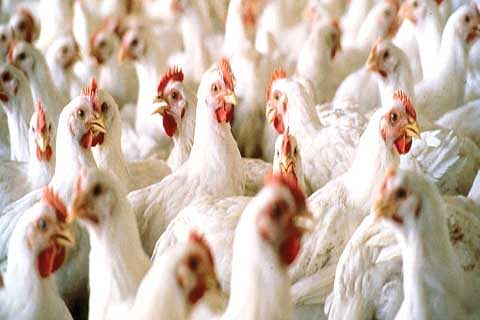Srinagar, Mar 19: Researchers at Sher-e-Kashmir University of Agricultural Sciences and Technology, Kashmir (SKUAST-K) have found the prevalence of Fowl Adenovirus stereotype 11 (FAdV-11), highlighting a grave threat to poultry farming in Kashmir.
The research ‘Molecular Detection of Fowl Adenovirus and its Genetic Variability’ conducted by Junaid Mehraj Lone from SKUAST-K, sheds light on the devastating impact of this viral strain, leading to increased mortality rates, and adverse effects on the farm industry.
As per the study, the FAdV-11 has been linked to severe health complications among poultry populations with its ability to induce the inclusion of hepatitis and hydropericardium, debilitating conditions that often result in fatal outcomes among infected birds.
The phylogenetic analysis of these sequences also revealed that strains from Kashmir shared homology with strains from Pantnagar, Tamil Nadu, Haryana, Kathua Raipur, Pakistan, and Brazil.
Lone, who conducted this research told Greater Kashmir that they had taken 200 samples of birds and found that the mortality rate associated with this virulent strain was staggering, reaching up to 10 percent among the affected poultry population.
“When combined with immunosuppressive diseases, mortality rates skyrocket to 30 to 80 percent. The alarming mortality pattern follows a rapid increase, with over 10 birds dying on the first day, escalating to hundreds within three days,” he said.
Lone said that current vaccines used in poultry farming were ineffective against stereotype 11 of Fowl Adenovirus, highlighting a critical gap in disease management strategies.
“Currently used vaccines against FAdV in poultry in Kashmir incorporate serotype 8 and 4. There is a need to incorporate serotype 11 in the vaccine as serotypes are not-cross protective,” Lone said.
He said that he had seen 22 outbreaks and in 11 outbreaks, almost more than 1 lakh birds were affected and spread infection as well.
“So, to curb Fowl Adenovirus, maintain good hygiene around the poultry farms, regular food, and most importantly, vaccination for particular strains, if there will be outbreaks,” he said.
The research also focused on the necessity for continuous monitoring, genetic surveillance, and international cooperation to combat the menace posed by Fowl Adenovirus in poultry farming.
“There is a need for refining control strategies, emphasising biosecurity measures, and implementing vaccination protocols to safeguard the poultry industry and ensure food production security,” he said.
Lone said that there was a need for national and international collaboration to address the growing threat posed by this deadly viral pathogen in the poultry industry.






